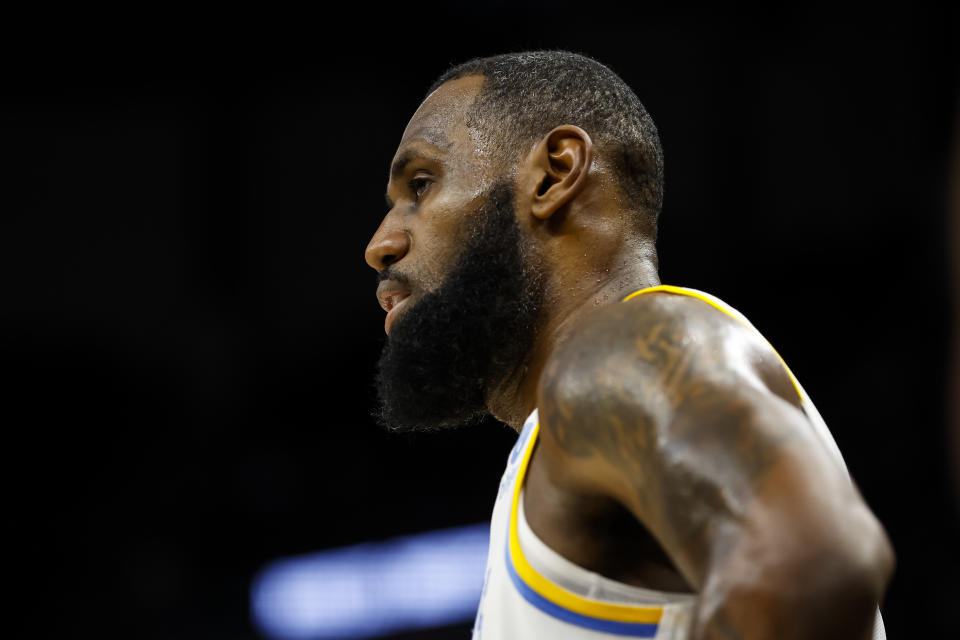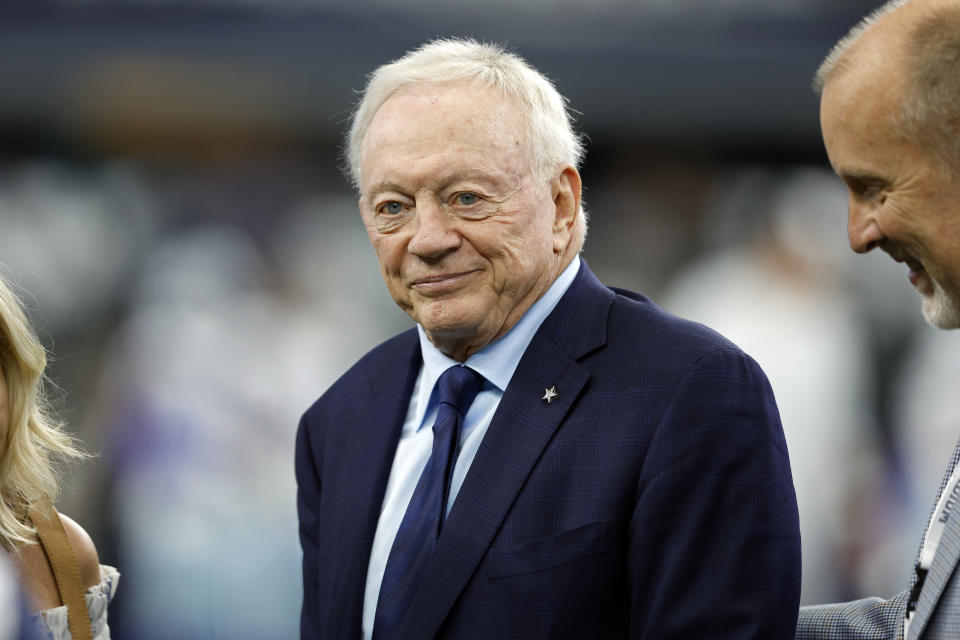We can’t have meaningful conversation if we can’t at least agree on what the conversation should be.
Everybody’s talking, perhaps feeding egos or agendas, not even dancing around the heart of the issue because it feels hard to locate. There’s been grandstanding, defending and preaching — even though the latter could be applied here — and the difference between the three feels impossible to discern.
LeBron James anointed himself a leader at various times during his long career, addressing issues as he saw fit and staying away from others at his wont. Being a spokesman for a sports league is difficult; being one for a group of people is impossible.
Perhaps because he’s been asked about every issue under the sun, he expected to be queried on a photo of a 14-year-old Jerry Jones that’s been circulated by the Washington Post. Jones was in attendance in 1950s Arkansas when Black students were attempting to integrate North Little Rock High School where Jones attended.
Or rather, in the eyes of 1950s Arkansas, infiltrate.
James, who was asked about former teammate Kyrie Irving’s dalliance with antisemitism a few weeks ago, went on to chastise the media for not asking him about Jones — because James used to be a Dallas Cowboys fan until the Colin Kaepernick controversy years ago.
It’s been speculated that James wants Irving as a teammate again in Los Angeles, so it was obvious to ask. James isn’t, though, an NFL player or owner. Imagine if someone asked him about Deshaun Watson’s legal troubles because of a Cleveland connection or Washington owner Daniel Snyder, just because.
It’s not that strong of a connective tissue to make a parallel comparison, but James has been a spokesperson on myriad issues that may or may not have anything to do with him.
In this case, it was a false equivalency and more accurately, outrage begetting outrage.
James insinuated he had something to say, but dropped the mic and walked off, preventing any follow-up questions addressing the actual issue.


Not to parse James here, but he referenced the photo of Jones, not the story that featured an interview and comments from Jones on the day in question and more important, his hiring practices in reference to race as Cowboys owner — having never hired a Black head coach in over 30 years and only two Black coordinators, the doorstep to the top spot, during his time.
James sees plenty of faces in front of him in these settings that don’t look like his own and turned the camera around. There’s nothing wrong with give-and-take, nothing wrong with the watchdog being watched and held accountable in the same ways powerful figures are.
But it has to make sense, and in that moment, it felt more condescending and one-ended than perhaps he intended. Perhaps unknowingly, of course, James opened the door to groups who never needed an invitation: the bad actors and the willfully disingenuous.
Of course, the Twitter machine got ahold and spread the photo like wildfire. It was full of retweets, favorites and threads of obvious dissertations, but the conversation was unfortunately diverted.
The low-hanging fruit is to talk about the grace Jones has been given, framing it in the reality of the day. Jones was a teenager in the South and this was a full decade before the assassination of Martin Luther King Jr.
Expecting him to be anything other than a child of his time is a bit unrealistic, even when juxtaposing it against Black teens of that day or any day. At any moment for a Black person, particularly then, a wrong step could lead to dire circumstances — death, even.
One supposes that could be the topic of the day, but broadening it wouldn’t be in the name of granting Jones bail.
Dunking on him for how he behaved, or potentially behaved, that day as a 14-year-old feels shortsighted. Talking about how he, a man of immense influence and power, has stood idle on issues of hiring in the NFL is the larger issue.
That photo is a snapshot, a tasty one for a public that loves dabbling in 160 characters but prefers to stay in the kiddie pool beyond it.
If only we as the public could have multiple mature, focused discussions, let alone one.
Social media has turned the lens in myriad directions, which would be fine if James actually had the discussion that has filled in the blanks of so many frustrations first.
Yes, Black folks are held to a higher account than white counterparts — not exactly a newsflash. And it’s not necessarily the discussion to have on this day, just like it wasn’t the discussion to have when Irving disrespected Jews.
In that photo, if one chooses to focus there, Jones only had but so much power — power in whiteness, strength in numbers. His power in his 30 years since owning the Cowboys is standing alone, not halting progress but not advancing it either.
Jones’ comments were so illuminating and rich — not just in mindset but in mere audacity. He’s not every owner in pro sports, but Jones certainly isn’t alone. His words spoke of the mindset many a parent of Black folks have told their children for years: You have to be twice as good to get half the credit.
Jones spoke of his ambition, getting onto golf courses to gain an audience in front of powerful people, before he became one. Implied in that, one could conclude, is his feeling that prospective Black coaches and executives don’t do enough to get in front of him — in avenues a scheduled interview won’t satisfy.
What he doesn’t realize — a powerful point — is that Black people don’t have access to those roads to shake Jones’ hand or discuss things in informal settings. He doesn’t realize there’s a cheat code he possesses that — combined with his visionary ways and ambitious approach — created the magnate we have today.


And he’s not alone in that thinking, regardless of what other owners do not say publicly. Jones just has the audacity to say the quiet things aloud, and without fail, will have an army of Black folks with personal experiences with Jones willing to vouch for him.
“Jerry did make a lot of Black players rich, but he did that in the name of winning,” an NBA front office executive told Yahoo Sports, being granted anonymity due to the sensitivity of the topic.
“[Former Alabama football coach] Bear Bryant didn’t get Black players until he started losing to [integrated] teams. [Former Kentucky basketball coach] Adolph Rupp got beat by the All-Black starting five at Texas Western, then he went and integrated. Does that mean these guys had a sudden change of heart? I have my doubts that it did.”
While it would be wonderful if these powerful men could hold hands with Black folks and sing “We Are the World,” feelings don’t matter. How someone is treated is the ultimate currency. No one has to be liked, but giving fair chances is what’s most attainable.
Owners, as a whole, are given reverential treatment by the public, and in large part by the media. Notice the “misters” in front of billionaires’ names as opposed to the first-name references to athletes, and also, how a very small and powerful bloc doesn’t have to account for their peers’ misgivings the same way players have to discuss topics they have nothing to do with.
James didn’t attack that point, nor did he even address the picture — one Jones could easily wiggle out of, one he addressed directly in the Washington Post story. But talking about the deeper, more nuanced issues requires one being ready to have the discussion.
The picture is reductive, almost saying, “Gotcha!” to a grown man for his tweets when he was 14 years old.
It doesn’t feel fruitful to go that route when there are so many other substantive discussions to have, ways this thing can pivot into something productive and closer to an NBA wheelhouse.
Have NBA team owners found religion in ways NFL franchise owners have not? There are more Black head coaches than in any other time in league history, after years of shameful numbers, slow hires and quick firings.
It can change in the blink of an eye, but they responded to public pressures in a moment and even if they’ve earned it, shouldn’t be given automatic benefit of the doubt.
Power only respects power in most cases, but fears a little pressure and inertia.
That’s the door Jones opened wide: The man who openly expressed affinity for people he knows and grew close to him but hesitancy for those in that space far, far away — even if they’re within arm’s reach.
Perhaps James will have read the story by the time he takes the microphone again, or at least has some CliffsNotes. He’s been an excellent, model spokesperson for the NBA — helping guide through choppy waters and taking the questions that should’ve been meant for others.
But be careful about wanting to be asked about everything. Because you’ll be asked about anything.
